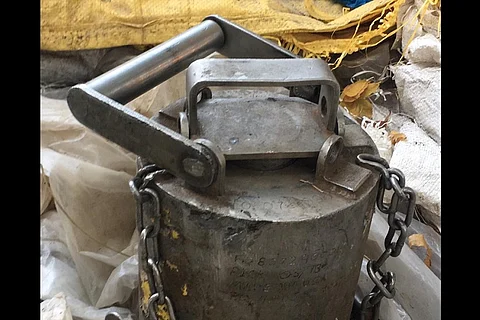

Radioactive isotope Caesium-137 (CS-137) which went missing from the Oil and Natural Gas Corporation's (ONGC) base in Rajamahendravaram in Andhra Pradesh earlier this month, was finally traced by the state police on Wednesday evening. The substance was found in a scrap yard at Kalidindi in Krishna District.
Speaking to reporters, DGP RP Thakur said that the substance was traced by the Central Crime Station (CCS) and Law & Order Teams which had been formed to hunt for the missing substance. They later verified with ONGC officials that it was the isotope that had been missing since January 14 and handed it over.
"The substance has been traced in a scrap yard at Kalidindi in Krishna district. Immediately after tracing, NDRF teams and ONGC officials were called to the spot for identification. The radioactive substance CS-137 have been recovered but the accused have not yet been identified. We are investigating the case and looking into all angles. The accused will be nabbed soon," Shemusi Bajpayee, Superintendent of Police, Rajamahendravaram, told reporters.
The incident had come to light during an internal audit following which ONGC officials filed a complaint with the Bommuru police. The isotope was said to be reported missing from a truck that transported it to the logging shed of the complex. Officials identified the substance as a few grams of Caesium-137 (CS-137), which was worth Rs 27 lakh.
ONGC authorities had even held a press meet to clarify that there was no danger to the public. Officials said that the radiation of the missing isotope was only 2.5 curie and explained that it was kept inside a lead container, which completely suppressed the gamma rays released by it.
“Even if you take the substance out of the container, its effect will only be felt in a 2-metre radius. There are reports doing the rounds that it will react with the air and might explode. This is totally false. It is not explosive material at all,” one official explained.
They also said that an internal inquiry had begun, to ascertain the lapses that caused the substance to go missing. The inquiry report is expected to be submitted soon.
According to the United States' Environmental Protection Agency (EPA), "Cesium is a soft, flexible, silvery-white metal that becomes liquid near room temperature, and the most common radioactive form of the substance is Cs-137, which is produced by nuclear fission. It is also one of the byproducts of nuclear fission processes in nuclear reactors and nuclear weapons."